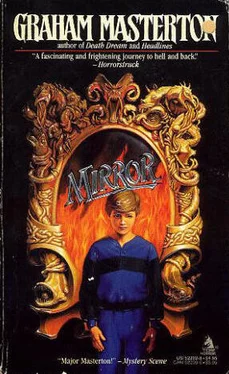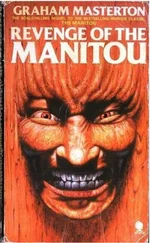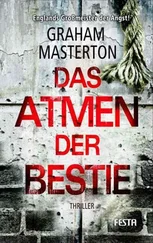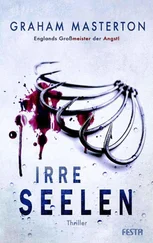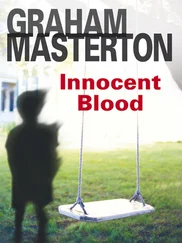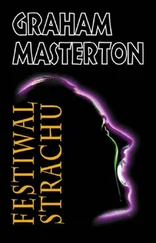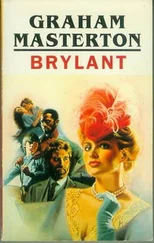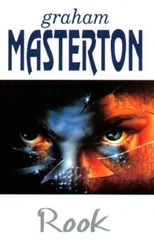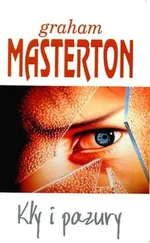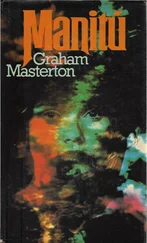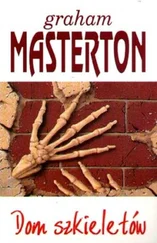'Is anything wrong here?' asked Lester Kroll, benevolently tilting his way over. He smelled strongly of whiskey. 'It's time we took our seats, isn't it? Come on, Pip, you young pipsqueak.'
June Lassiter came up to Martin and said, 'I don't know how you managed to inveigle yourself in here, Martin, and I don't think I want to find out. But since you're here, and since you wrote so much of the picture, and since poor Morris is in such a bad way . .. well, you can have a couple of seats at the back.'
'You're a princess, June,' said Martin, trying to tug his vest straight.
'Think nothing of it,' June told him. 'You're a good writer; and now you've gotten Boofuls out of your system, maybe you'll turn out to be a great writer. Tell me one thing, though.'
'Anything.'
'Where the hell did you get that tuxedo? It looks like it came off the city dump.'
Martin looked down at his drooping elephant's-ear lapels. 'You wouldn't believe me even if I told you.'
After a few minutes, Martin and Ramone were beckoned through the crowds by Kathy Lupanek and shown to two seats at the very back of the theater. The auditorium was already packed, and there was an endless cascade of excited conversation, as well as the usual coughing and shuffling and waving and women calling out, 'Aaron, darling\ I didn't know you were here!'
'Long time since I sat in the back row,' Ramone remarked. 'And I never sat in the back row with a guy before!'
At last, the theater lights dimmed; and a single spotlight fell onto the stage in front of the drapes. There was a roll of recorded drums, and then Boofuls appeared, in the white suit that he would be wearing toward the end of the film, when he was pleading with God to let him be an angel. The audience roared and cheered, and one after another they got out of their seats to give Boofuls a standing ovation. 'And - Jesus — they haven't even seen the movie yet!' marveled Ramone.
'The power of publicity,' Martin remarked, standing up so that he could get a better look at Boofuls, but not clapping.
Boofuls raised his arms and eventually the clapping spattered away to nothing and everybody sat down. He paused for a short while, not smiling, but bright-eyed, and then he said, 'You don't know how happy you've made me. I hope only that I can make you just as happy in return.'
The audience applauded him some more. Again, he gently silenced them.
'Once upon a time,' he said, and his piping voice sounded weirdly echoing and distorted through the loudspeakers, as if he were talking down a storm drain. 'Once upon a time there was a boy; and that boy was a legend in his own short lifetime. Once upon a time there was a musical; and that musical was never finished.
'The story of that boy and that unfinished musical is too tragic for us to think about tonight. Instead, let us celebrate another boy, and a musical that has been finished. A boy, and a musical, which all of us who worked on Sweet Chariot have grown to believe will change the world.'
A large woman in a tight black dress who was sitting just in front of Martin leaned over to her red-faced companion and whispered, 'Cocky little so-and-so, isn't he? Just like Vernon was telling us. Do you know he wouldn't even let the producer see the whole picture. And they went through seven editors. Seven!'
'Ssh, Velma, he's magic,' her companion replied.
'Magic, my ass,' Velma retorted.
Boofuls left the stage and went to sit between June Lassiter
and Miss Redd. The audience cheered him so vociferously that he had to stand on his seat and wave to them. At last the drapes swept back, and the audience fell silent, but there was a low murmuring of excitement all around.
Then the first chords of music sounded; and New York appeared on the screen; and the audience settled down.
Martin stared at the screen for over an hour without moving or saying a word. He was completely hypnotized. The music was so ravishing; the dances were so dazzling; the photography was unlike anything he had ever seen before. And right from the moment when he first appeared on the screen, Boofuls wrung his emotions in a way which Martin wouldn't have believed possible.
Martin hated this boy; he absolutely detested him. Yet when he was kneeling on the sidewalk trying to save the life of a dying friend, Martin found that his eyes filled up with tears and his throat choked up. He looked around the theater and saw everybody was weeping, everybody, including Ramone, and that some women were so upset that they were hiding their faces in their hands.
When the musical reached the moment when Boofuls has to choose between staying with his mother and becoming an angel, and sings a song while his mother goes about her daily chores, unable to see him, the grief in the audience became almost uncontrollable. Martin found himself smearing tears away from his eyes with his hand; and several people were sobbing in genuine grief.
'Mother . . . how can I leave you Even when the angels are calling? Mother . . . how can I turn away Into the rain that will always and always befalling?'
Martin turned from Ramone to wipe his eyes. But, as he did so, to his bewilderment, he caught sight of Boofuls and Miss Redd hurrying hand in hand toward the theater's side exit. And when he saw that, the melodramatic spell that Sweet Chariot had been casting over him was immediately and unexpectedly broken. He said, 'Ramone! Ramone!' and Ramone looked at him tearfully. 'Ramone, something's going down here, something bad.'
'Man, this movie makes me feel so goddamn sad,' Ramone said chokily.
'No,' said Martin. 'It's more than that. It's like mass hysteria.'
He looked around at the weeping, distraught audience. Their wet cheeks glistened in the half darkness. Some of them were covering their faces with their hands and sobbing as if they were totally distraught.
At last Martin began to understand why Boofuls had allowed hardly anybody to see the completed picture, and why he had insisted on its being premiered simultaneously throughout the world. It wasn't just a brilliant and captivating musical. It was a hymn to human tragedy. In a particularly subtle and convincing way, it dramatized not hope and faith and human optimism, like most musicals, but utter despair. It highlighted the inevitability of death and the uselessness of life. The only way to true fulfillment was never to be born at all.
Martin also began to understand why Mrs Alicia Crossley had felt it necessary to slaughter Boofuls before he had been able to finish the original version of Sweet Chariot. In some extraordinary mesmerizing way, Sweet Chariot was capable of drawing its audiences into a whirlpool of helpless emotion, like drowning moths being sucked down a drain, and Martin began to be desperately afraid of what was going to happen next.
'Come on,' he told Ramone. 'Let's get the hell out of here.'
'I want to see the end,' Ramone protested.
'Out!' Martin snapped at him, and grabbed hold of his sleeve.
Ramone struggled and argued, but then one of the ushers shone a torch at him and said, 'Out of there, please, sir. You're disturbing other folks' enjoyment.'
At last, still grumbling, Ramone allowed himself to be escorted out to the lobby.
'That movie is like some kind of drug, almost,' Martin told him. 'Can't you feel what it's done to your emotions? It's washed you and spun you and hung you out to dry! God knows what's going to happen to the rest of that audience.'
Ramone took two or three deep breaths, then stared at Martin as if he had never seen him before. 'That was terrible,' he said, and he sounded genuinely shaken. 'I feel like I have a hangover. Man, I felt so miserable?
Читать дальше
